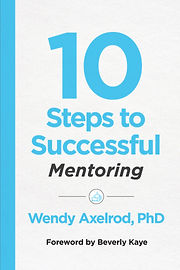
Mentoring
Background
The Conference Board reported that in 2019, CEO’s top internal concern is the quality of talent and leader development. While companies are focusing on staying competitive, producing long term impact and assuring shorter term performance….the workforce is hungry for both growth and meaning in their work. Mentoring can play an essential role in addressing all these needs. Mentoring can be positioned in organizations to increase performance, engagement, and retention, while providing significant and meaningful growth for professionals and leaders.
So, what is standing in the way? A study in 2017 identified that many companies undervalue and underplay mentoring, viewing at as an informal process, and not integrating with the overall Talent Management of Business Strategy. Further, often companies provide only basic mentor development, focusing largely on the structure and mentor requirements of the program.
To mentor well, whether part of a company program or not, there are deliberate skills involved; actions to take, and actions not to take. Masterful mentors know how or create a strong foundation that leads to a rich and meaningful experience for both the mentor and mentee, including collaboratively setting mentee goals for this experience, crafting a reliable game plan, and discussing how the two will address challenges in the mentoring process. The mentor supports the mentee in taking risks: trying out new mindsets and behaviors, exploring bigger perspectives, and “going internal” to understand more about themselves. Pausing for insights, especially when your mentee feels safe enough to talk about what is on their mind, can create new approaches to problems they face, and increase determination.
The masterful mentor also asks lots of questions, being both thoughtful and courageous. They know how to ask, how to listen, and what goes into growth –provoking questions. They increase their expertise in a process that involves far less telling, problem fixing and opinion sharing, and more about stretching and enabling (similar to what is used by the most seasoned certified coaches). They offer their mentees resources and tools, they diversify the mentee’s development methods, and let them go at it. Masterful mentors also help their mentees increase their own influence skills, essential to career growth, yet often over looked in typical mentoring approaches. In addition, the masterful mentor is prepared for challenges that can occur in the relationship whether there is broken boundaries, a gradual loss of momentum, or inadvertent roadblocks to the mentoring.
Masterful mentors provide powerful and life changing for the individuals receiving it. Yet, there is so much more….importantly, the growth in the mentoring process goes both ways. The development journey can be just as growth producing for the mentor, as it is for the mentee. Mentors receive incredible rewards that reach far beyond the months or years they spend with their mentee:
-
Enhancements to their own career as they gain skills in coaching and facilitating change
-
Learning what it takes to truly develop others
-
Staying relevant
-
Gaining new perspectives
-
Learning more about themselves

Wendy Wrote the Book on Mentoring!
10 Steps to Successful Mentoring became an Amazon Best Seller upon publication in June, 2019. The Association of Talent Development requested that Wendy write their core book on Mentoring, based on her two decades of creating, managing, and consulting on Mentoring Programs.
Enhance the impact of your company’s Mentoring program.
Focus is on: assessing current offering (including: identifying the right candidates, establishing the structure of the program, providing training for mentors and mentees, ongoing support of program participants, etc.), laying groundwork for elevating the program to be a driver of Talent Development Strategy, creating the important stakeholder relationships, creating measures of success, and implementing improvement goals, based upon the assessment. for mentors, practicing coaching skills with peers.
Develop new and experienced mentors through on-site or virtual workshops, and ongoing support.
Focus is on: engaging new and experienced mentors in highly interactive workshops to learn and grow with “10 Steps to Successful Mentoring” (covering everything from establishing the relationship to bringing closure); providing interim workshops or webinars for mentors for their continued growth in that role.
Conduct Mentor Peer groups that meet regularly while mentors are in the mentoring process.
Focus is on: Establishing and facilitating regular cohort meeting of mentors to discuss successes and challenges of their mentoring, providing new tools for mentors, practicing coaching skills with peers.